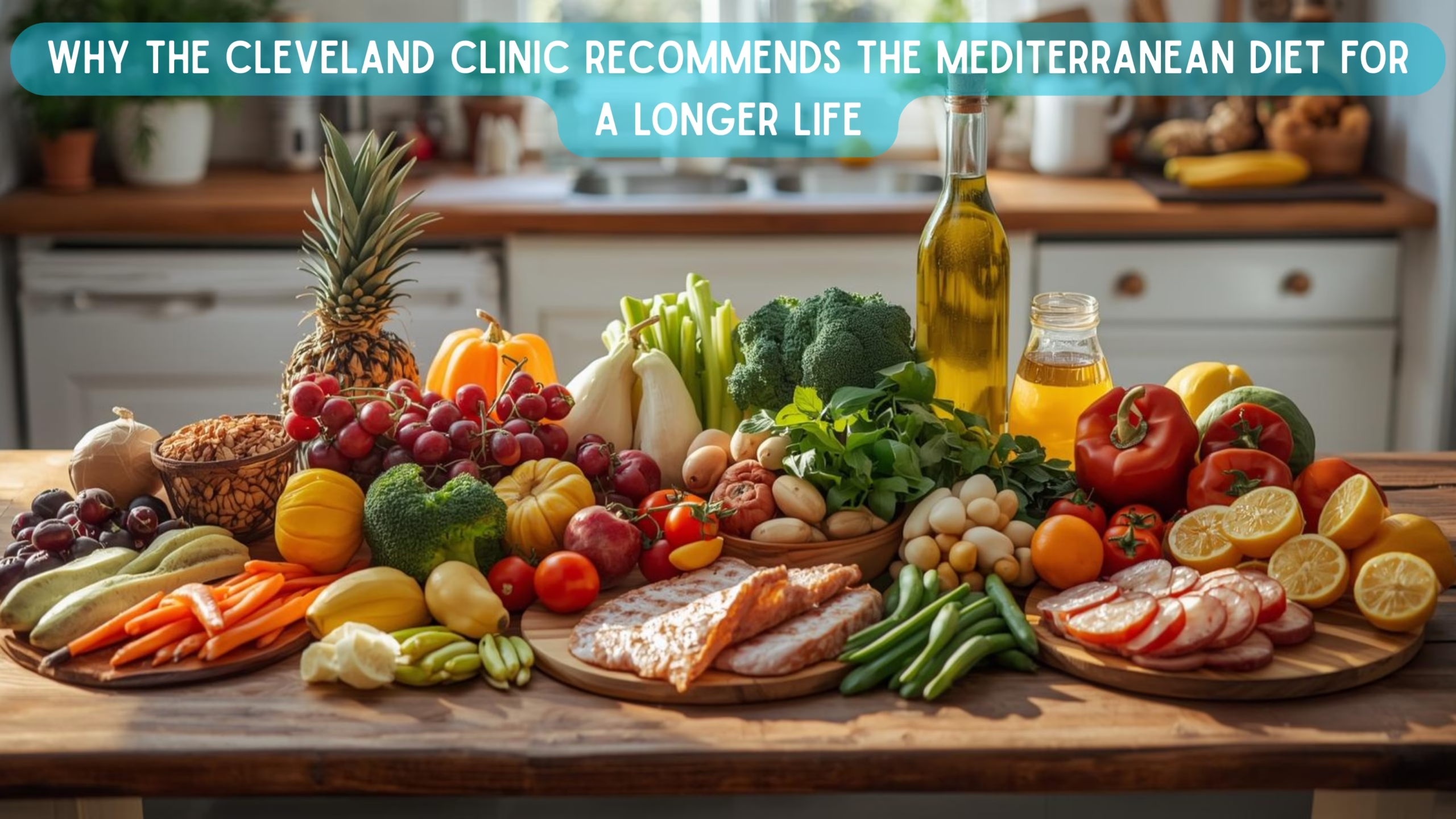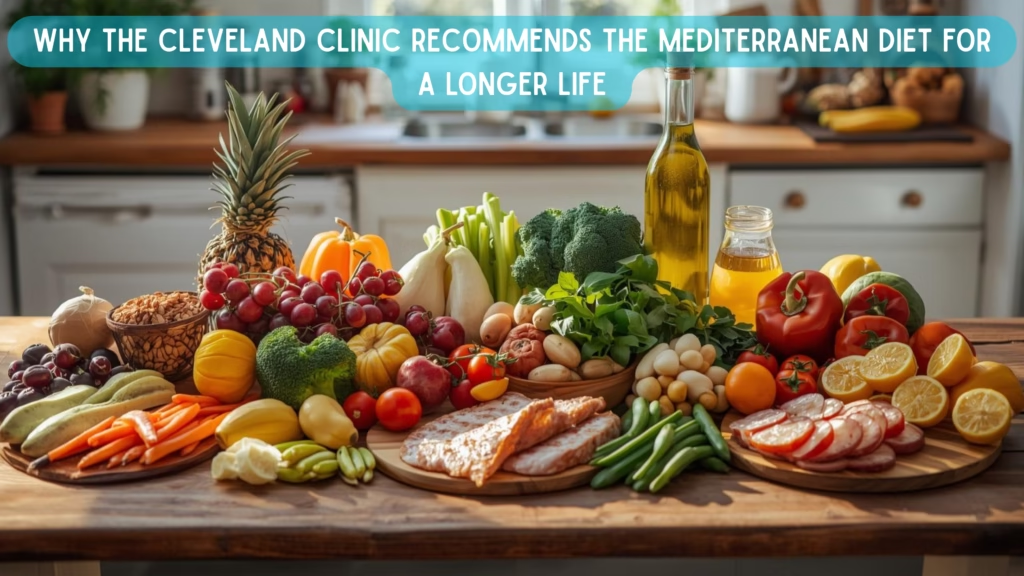Why the Cleveland Clinic Recommends the Mediterranean Diet for a Longer Life

Cleveland Clinic Mediterranean diet recommendations have become a cornerstone of modern nutritional guidance, and for good reason. The renowned medical institution consistently ranks this eating pattern among the healthiest approaches to food, citing overwhelming evidence that it can add years to your life while simultaneously improving the quality of those years. Simply put, the Mediterranean diet isn’t just another trend—it’s a scientifically-backed lifestyle that has stood the test of time and rigorous medical scrutiny.
The Cleveland Clinic’s endorsement stems from decades of research showing that people who follow Mediterranean eating patterns experience lower rates of heart disease, stroke, type 2 diabetes, and certain cancers. More impressively, studies have demonstrated that adherents to this diet live longer, healthier lives with better cognitive function well into their golden years.
Understanding What Makes the Cleveland Clinic Mediterranean Diet Special
Cleveland Clinic Mediterranean diet guidelines emphasize a way of eating that mirrors the traditional dietary patterns of countries bordering the Mediterranean Sea, including Greece, Italy, and Spain. But this isn’t about following rigid meal plans or counting every calorie. Instead, it’s about embracing a holistic approach to food that prioritizes whole, minimally processed ingredients and finds joy in the act of eating.
At its core, the diet centers on plant-based foods. We’re talking about abundant vegetables, fruits, whole grains, legumes, nuts, and seeds forming the foundation of every meal. Olive oil serves as the primary source of added fat, replacing butter and other saturated fats that dominate typical Western diets. Fish and seafood appear on the table at least twice weekly, while poultry, eggs, cheese, and yogurt play supporting roles in moderation.
Red meat becomes an occasional treat rather than a daily staple, and sweets are reserved for special occasions. Perhaps just as important as what you eat is how you eat it—the Mediterranean approach celebrates meals as social occasions, encouraging people to slow down, savor their food, and share it with others.
The Science Behind Cleveland Clinic’s Mediterranean Diet Advocacy
Cleveland Clinic Mediterranean diet research draws from an impressive body of evidence accumulated over more than half a century. The landmark Seven Countries Study, initiated in the 1950s, first identified the remarkable health outcomes of Mediterranean populations. Since then, countless studies have reinforced these findings with modern scientific rigor.
One of the most compelling pieces of evidence comes from the PREDIMED study, a large-scale trial conducted in Spain. This research followed thousands of participants and found that those assigned to a Mediterranean diet supplemented with extra virgin olive oil or nuts had a 30% lower risk of major cardiovascular events compared to those on a low-fat diet. The results were so dramatic that researchers ended the study early because it would have been unethical to continue denying the control group these benefits.
The Cleveland Clinic points to additional research showing that the Mediterranean diet reduces inflammation throughout the body—a key driver of aging and chronic disease. The diet’s high content of antioxidants, healthy fats, and fiber works synergistically to protect cells from damage, maintain healthy blood vessels, and support optimal metabolic function.
How the Cleveland Clinic Mediterranean Diet Protects Your Heart
Cleveland Clinic Mediterranean diet recommendations place particular emphasis on cardiovascular health, which makes perfect sense given that heart disease remains the leading cause of death in America. The diet addresses heart health through multiple mechanisms that work together like a finely tuned orchestra.
First, the abundance of monounsaturated fats from olive oil and omega-3 fatty acids from fish helps improve cholesterol profiles. These healthy fats raise HDL (good) cholesterol while lowering LDL (bad) cholesterol and triglycerides. But it’s not just about the numbers on a lab report—these changes translate into cleaner, more flexible arteries that can efficiently deliver oxygen-rich blood throughout your body.
The diet’s anti-inflammatory properties prove equally important. Chronic inflammation damages blood vessel walls and promotes the formation of dangerous plaques. Mediterranean staples like olive oil, fatty fish, nuts, and colorful vegetables contain powerful anti-inflammatory compounds that help keep blood vessels healthy and resilient.
Blood pressure also responds favorably to this eating pattern. The combination of potassium-rich fruits and vegetables, limited sodium, and healthy fats helps maintain optimal blood pressure levels naturally—often reducing or eliminating the need for medication in people with mild to moderate hypertension.
Mediterranean Diet’s Impact on Brain Health and Longevity

Cleveland Clinic Mediterranean diet studies have revealed fascinating connections between this eating pattern and cognitive function. As we age, brain health becomes increasingly crucial to maintaining independence and quality of life. The Mediterranean diet appears to offer significant protection against cognitive decline and dementia.
Research shows that adherents to the Mediterranean diet have larger brain volumes, particularly in areas critical for memory and learning. They also demonstrate better cognitive performance on tests measuring attention, processing speed, and executive function. These aren’t marginal improvements—we’re talking about the kind of differences that can mean the distinction between aging gracefully and struggling with daily tasks.
The protective mechanisms likely stem from the diet’s effect on vascular health. Your brain requires an enormous amount of blood flow to function properly, and the same factors that keep your heart healthy also maintain robust cerebral circulation. Additionally, the diet’s rich antioxidant content helps neutralize free radicals that would otherwise damage delicate brain tissue.
Perhaps most intriguing are findings suggesting that the Mediterranean diet may reduce the risk of Alzheimer’s disease by up to 40%. While we don’t yet have a cure for this devastating condition, the prospect of preventing it through dietary choices offers tremendous hope.
Weight Management Through the Cleveland Clinic Mediterranean Diet
Cleveland Clinic Mediterranean diet guidance presents a refreshing alternative to restrictive weight-loss diets that leave people hungry and miserable. While weight loss isn’t the primary goal, many people find that they naturally shed excess pounds when adopting this eating pattern—and they keep it off long-term.
The secret lies in the diet’s high satiety factor. Foods rich in fiber, protein, and healthy fats keep you feeling full and satisfied for hours. When you fill your plate with vegetables, whole grains, beans, nuts, and fish, you’re consuming fewer calories while actually eating more food by volume. It’s a nutritionist’s dream scenario.
Unlike fad diets that eliminate entire food groups or require you to eat in ways that clash with normal social life, the Mediterranean approach feels sustainable and enjoyable. You’re not constantly battling cravings or feeling deprived. Instead, you’re discovering new flavors, enjoying delicious meals, and naturally gravitating toward appropriate portions.
Studies confirm that people following the Mediterranean diet achieve better long-term weight management compared to those on traditional low-fat diets. Even more importantly, they show improvements in metabolic markers regardless of whether they lose weight—suggesting that the diet’s benefits extend far beyond the number on the scale.
Cleveland Clinic Mediterranean Diet and Disease Prevention
Cleveland Clinic Mediterranean diet protocols have demonstrated remarkable effectiveness in preventing and managing a wide range of chronic diseases that plague modern society. The evidence base extends well beyond cardiovascular health to encompass metabolic, inflammatory, and even certain types of cancer.
Type 2 diabetes prevention and management represent one of the diet’s most impressive achievements. The Mediterranean eating pattern helps regulate blood sugar levels through several mechanisms: high fiber content slows sugar absorption, healthy fats improve insulin sensitivity, and the absence of processed foods prevents blood sugar spikes. Research indicates that following this diet can reduce diabetes risk by approximately 50% and help those already diagnosed achieve better glycemic control.
The anti-inflammatory nature of the diet also makes it particularly valuable for people dealing with autoimmune conditions, arthritis, and inflammatory bowel diseases. While it’s not a cure, many people report reduced symptoms and improved quality of life when they embrace Mediterranean eating principles.
Cancer prevention adds another dimension to the diet’s protective effects. While no diet can guarantee cancer prevention, evidence suggests that Mediterranean dietary patterns may reduce the risk of certain cancers, particularly those of the digestive system and breast. The abundance of antioxidants, fiber, and beneficial plant compounds likely contributes to this protective effect.
Practical Steps to Implement the Cleveland Clinic Mediterranean Diet
Cleveland Clinic Mediterranean diet implementation doesn’t require a complete overnight overhaul of your kitchen and eating habits. The most successful approach involves gradual, sustainable changes that eventually become second nature.
Start by upgrading your fats. Replace butter and vegetable oil with extra virgin olive oil for cooking and dressing salads. This single change delivers immediate health benefits and introduces you to the cornerstone of Mediterranean cuisine. Choose olive oil with a harvest date on the bottle and store it in a cool, dark place to preserve its beneficial compounds.
Next, rethink your protein sources. Plan at least two seafood meals per week, focusing on fatty fish like salmon, sardines, mackerel, or trout that deliver heart-healthy omega-3s. When you do eat meat, choose lean poultry and reserve red meat for occasional consumption—think once or twice per month rather than several times per week.
Transform your plate proportions by making vegetables and whole grains the stars of your meals. Aim to fill half your plate with colorful vegetables at lunch and dinner. Experiment with ancient grains like farro, bulgur, and quinoa. Discover the satisfying versatility of legumes—beans, lentils, and chickpeas can form the foundation of countless delicious dishes.
Snacking becomes an opportunity rather than a guilty pleasure. Keep nuts, fresh fruit, and vegetable sticks with hummus readily available. These nutrient-dense options satisfy hunger between meals while contributing to your overall health goals.
The Social and Lifestyle Components That Matter
Cleveland Clinic Mediterranean diet philosophy extends beyond the food on your plate to encompass how you approach eating and living. This holistic perspective recognizes that health emerges from the intersection of nutrition, physical activity, stress management, and social connection.
The Mediterranean tradition of eating with others isn’t just about manners—it’s about health. Sharing meals with family and friends encourages mindful eating, appropriate portion sizes, and positive emotional associations with food. When you slow down and engage in conversation, you give your body time to register fullness signals, naturally preventing overeating.
Physical activity forms another pillar of the Mediterranean lifestyle. Traditional Mediterranean cultures built movement into daily life through walking, gardening, and manual labor. You don’t need to become a marathon runner, but incorporating regular moderate activity—whether that’s daily walks, swimming, cycling, or dancing—amplifies the diet’s benefits.
Wine consumption often comes up in discussions of the Mediterranean diet. The Cleveland Clinic notes that moderate red wine consumption (one glass per day for women, up to two for men) may offer some health benefits due to its antioxidant content. However, these benefits can also be achieved through other foods, and alcohol isn’t recommended for everyone. If you don’t currently drink, there’s no need to start.
Making the Cleveland Clinic Mediterranean Diet Work for You
Cleveland Clinic Mediterranean diet adaptation should respect your individual circumstances, preferences, and cultural background. The beauty of this eating pattern lies in its flexibility—it’s a framework for healthy eating rather than a rigid prescription.
Budget concerns often prevent people from exploring healthier eating options, but the Mediterranean diet can actually be quite economical. Focus on seasonal produce from farmers’ markets or discount grocers. Buy dried beans and lentils in bulk—they’re incredibly inexpensive and versatile. Canned fish like sardines and salmon provide affordable omega-3s. Frozen vegetables offer nutrition and convenience at lower prices than fresh.
For busy schedules, meal preparation becomes your secret weapon. Dedicate a couple of hours on weekends to batch-cooking staples like whole grains, roasted vegetables, and bean dishes. These components can be mixed and matched throughout the week to create quick, satisfying meals. A well-stocked pantry with olive oil, canned tomatoes, pasta, rice, beans, and spices makes it easy to throw together a Mediterranean-inspired meal on the busiest evenings.
Cultural adaptation ensures the diet feels personally meaningful rather than foreign and forced. If you come from an Asian background, you might emphasize fish, vegetables, and rice while incorporating olive oil and reducing red meat. Latin American cuisines naturally align with Mediterranean principles through their use of beans, vegetables, and whole grains. The key is identifying the overlap between Mediterranean principles and your culinary heritage.
The Cleveland Clinic’s Final Word on Mediterranean Eating
Cleveland Clinic Mediterranean diet recommendations represent more than just nutritional advice—they offer a roadmap to a longer, healthier, more vibrant life. The evidence supporting this eating pattern has reached a critical mass that few other dietary approaches can match. From protecting your heart and brain to preventing chronic diseases and supporting healthy aging, the Mediterranean diet delivers comprehensive benefits that touch virtually every aspect of health.
What makes this approach particularly valuable is its sustainability. Unlike restrictive diets that feel like punishment, the Mediterranean diet celebrates food, flavor, and the joy of eating. It acknowledges that we eat not just for nutrition but for pleasure, connection, and cultural expression. By aligning health goals with culinary enjoyment, it creates a virtuous cycle where healthy choices feel natural and satisfying rather than obligatory.
The Cleveland Clinic’s enthusiasm for the Mediterranean diet reflects a broader shift in medicine toward prevention and lifestyle intervention. Rather than waiting for disease to strike and then treating it with medications and procedures, we now have compelling evidence that simple dietary changes can prevent most chronic diseases from developing in the first place.
Starting today, you can take meaningful steps toward adopting Mediterranean eating principles. You don’t need to be perfect, and you don’t need to change everything at once. Each meal represents an opportunity to nourish your body with foods that support long-term health. Whether you’re 25 or 75, it’s never too early or too late to embrace the dietary pattern that the Cleveland Clinic and countless other health authorities agree represents the gold standard for healthy eating.
The Mediterranean diet isn’t a temporary fix or a quick solution—it’s an investment in your future self. By choosing this path, you’re joining millions of people around the world who have discovered that the most delicious way to eat also happens to be the healthiest. Your heart, brain, waistline, and future self will thank you for making this choice today.
SOURCES
We carefully draw from trusted, evidence-backed sources to ensure our content’s accuracy and reliability.
Cleveland Clinic – Why the Mediterranean Diet Is Best
✅ Supports: Introduction, benefits for longevity and overall health.
Cleveland Clinic – Mediterranean Diet Menu & Meal Plan
✅ Supports: What makes the diet special, food choices, and structure.
Cleveland Clinic – Heart Health
✅ Supports: Cardiovascular benefits, cholesterol, and inflammation.
Cleveland Clinic – Brain Health
✅ Supports: Cognitive function, Alzheimer’s prevention, brain longevity.
Cleveland Clinic – Olive Oil Benefits
✅ Supports: Practical steps, healthy fats, and meal prep tips.
Cleveland Clinic – Lifestyle Components
✅ Supports: Social meals, physical activity, and holistic lifestyle.
Cleveland Clinic – Disease Prevention & Cancer Risk
✅ Supports: Chronic disease prevention, diabetes, cancer, and inflammation.
You May Also Like:
How to Make Homemade Pita Bread. A Simple Step-by-Step Guide
Pita Bread Making Pita bread represents one of the oldest forms of bread still commonly…
7 Comforting Mediterranean Diet Soups Made with Simple, Healthy Ingredients
Mediterranean diet soups represent a cornerstone of one of the world’s healthiest eating patterns, combining…
I’m from Bhutan. Here’s How I Combined Local Foods with the Mediterranean Diet for Better Energy
Growing up in Phuntsholing, I never imagined that the traditional Bhutanese foods my grandmother cooked…
Mediterranean Diet Whole Grains: The Complete Guide to Heart Health and Longevity
Mediterranean Diet Whole Grains: The Complete Guide to Heart Health and Longevity Mediterranean diet whole…
How to Combine Asian Spices with the Mediterranean Diet for Maximum Flavor and Health Benefits
Asian spices with the Mediterranean diet create an extraordinary culinary fusion that doesn’t just taste…
Cleveland Clinic Mediterranean Diet: Why It’s Best for a Longer Life
Why the Cleveland Clinic Recommends the Mediterranean Diet for a Longer Life Cleveland Clinic Mediterranean…

Hello! I’m Sangay Choda, the creator of Mediterranean Diet Choice.
I’m not a doctor or licensed dietitian — I’m a health enthusiast who has spent years exploring the Mediterranean lifestyle and its proven benefits for long-term wellness, balance, and longevity.
My interest in this way of living began with a simple goal: to understand how everyday food choices can protect our hearts, improve energy, and support a happier life. Over time, I have researched and curated information from trusted medical and nutritional authorities, such as:
Harvard T.H. Chan School of Public Health
Mayo Clinic
World Health Organization (WHO)
National Institutes of Health (NIH) and more
I take complex, research-backed insights from these sources and transform them into easy-to-read, practical guides that anyone can apply — especially those looking to live healthier without restrictive diets or complicated plans.
While I do not offer medical advice, every article on this website is created with care, transparency, and a commitment to evidence-based information. My mission is to help readers make informed choices for a balanced, Mediterranean-inspired lifestyle.
Disclaimer: The content on this site is for informational and educational purposes only and should not be used as a substitute for professional medical advice. Always consult a qualified healthcare provider before making significant health or dietary changes. For more details, please visit our Disclaimer page.
For additional information about this website and its purpose, visit our About page. You can also review our Terms & Conditions to understand your rights and responsibilities when using this site.
Thank you for visiting Mediterranean Diet Choice.If you have questions, suggestions, or wish to collaborate, feel free to reach out at contact@mdietchoice.com or contact us.







